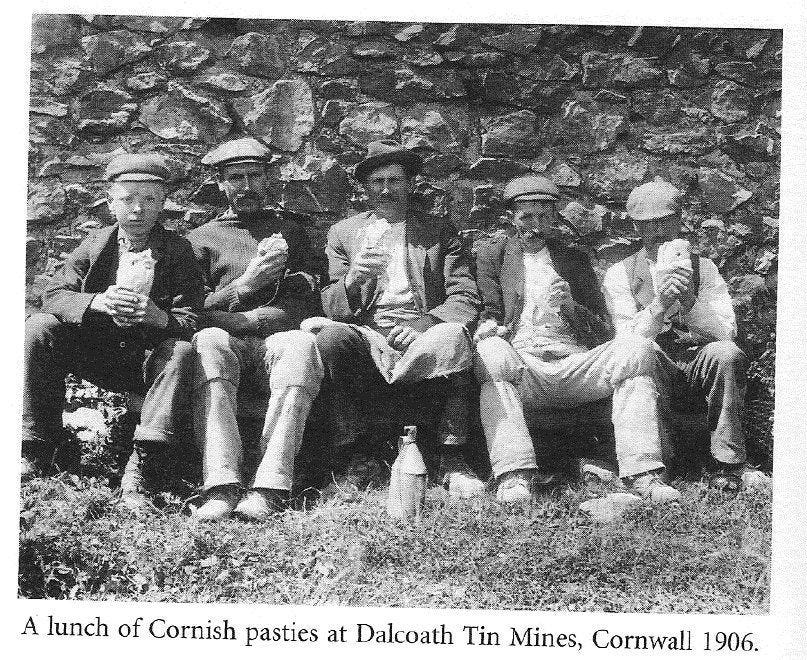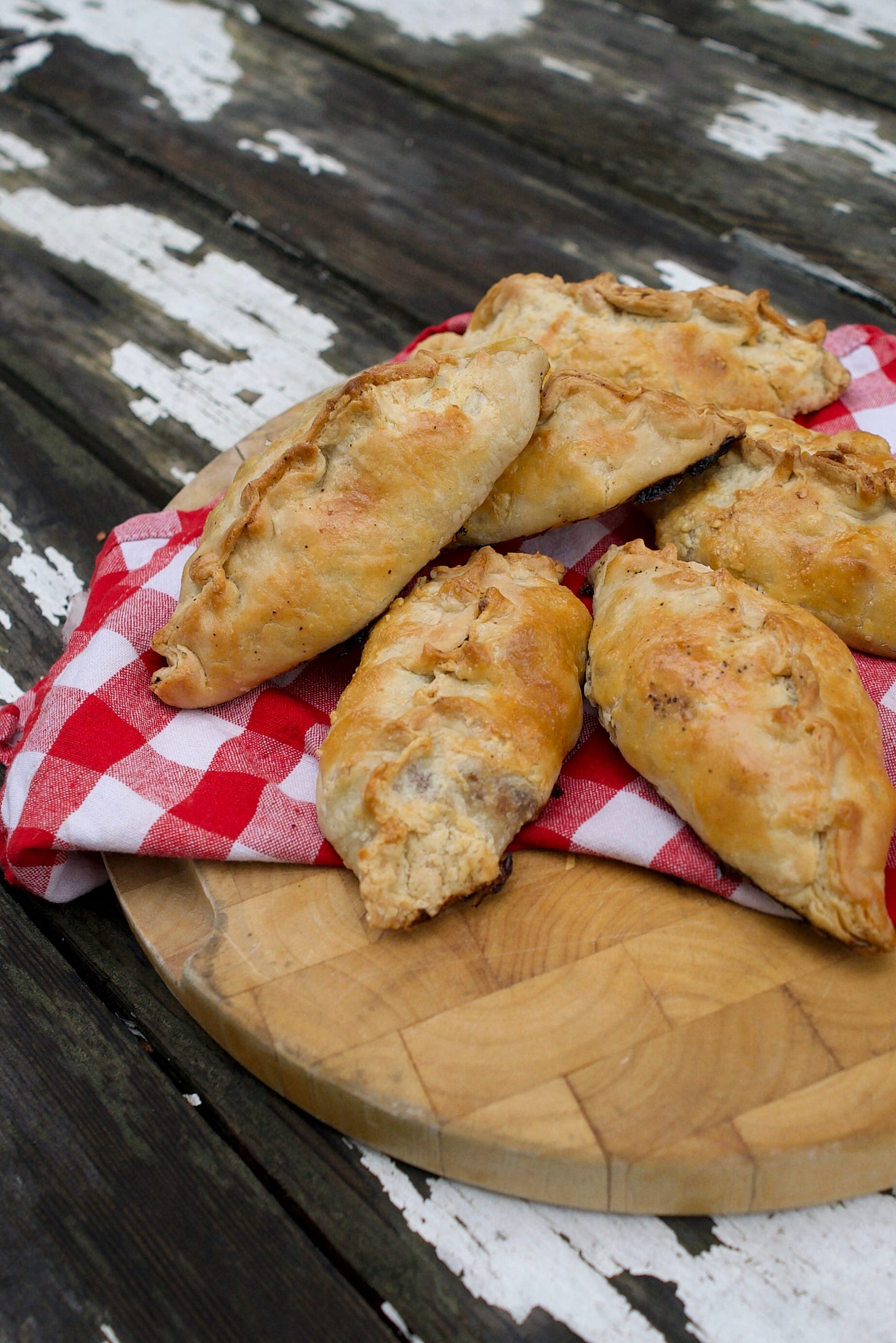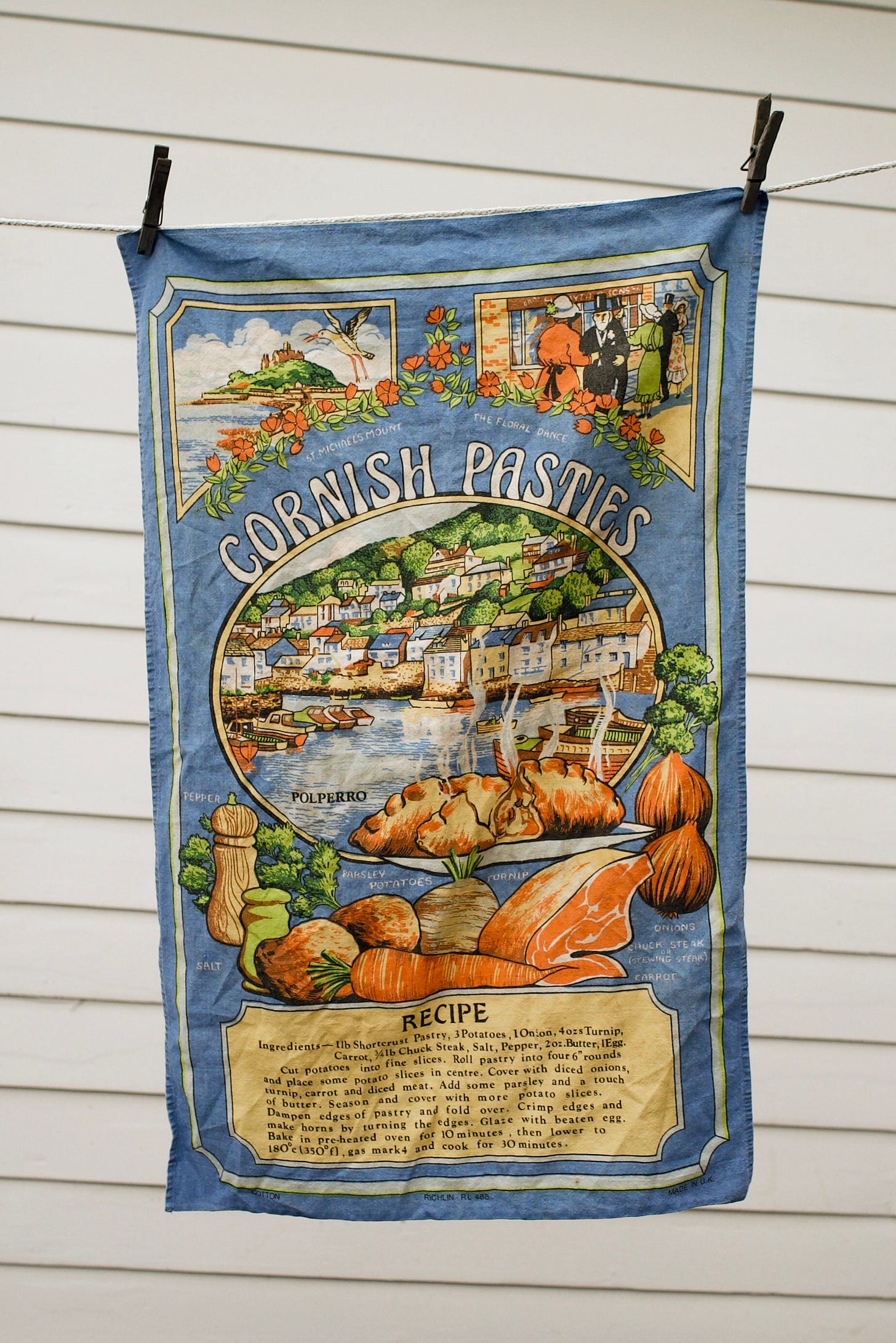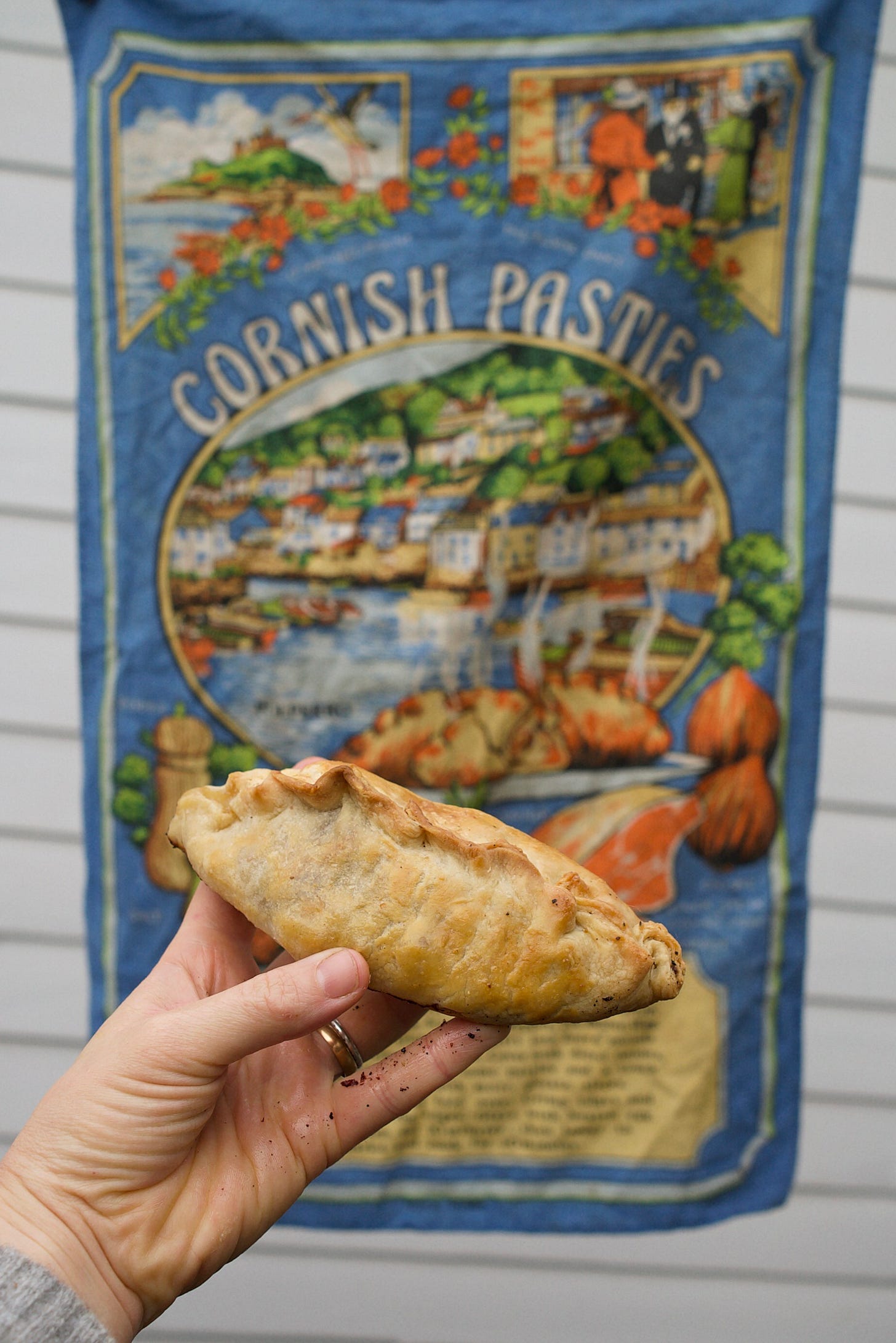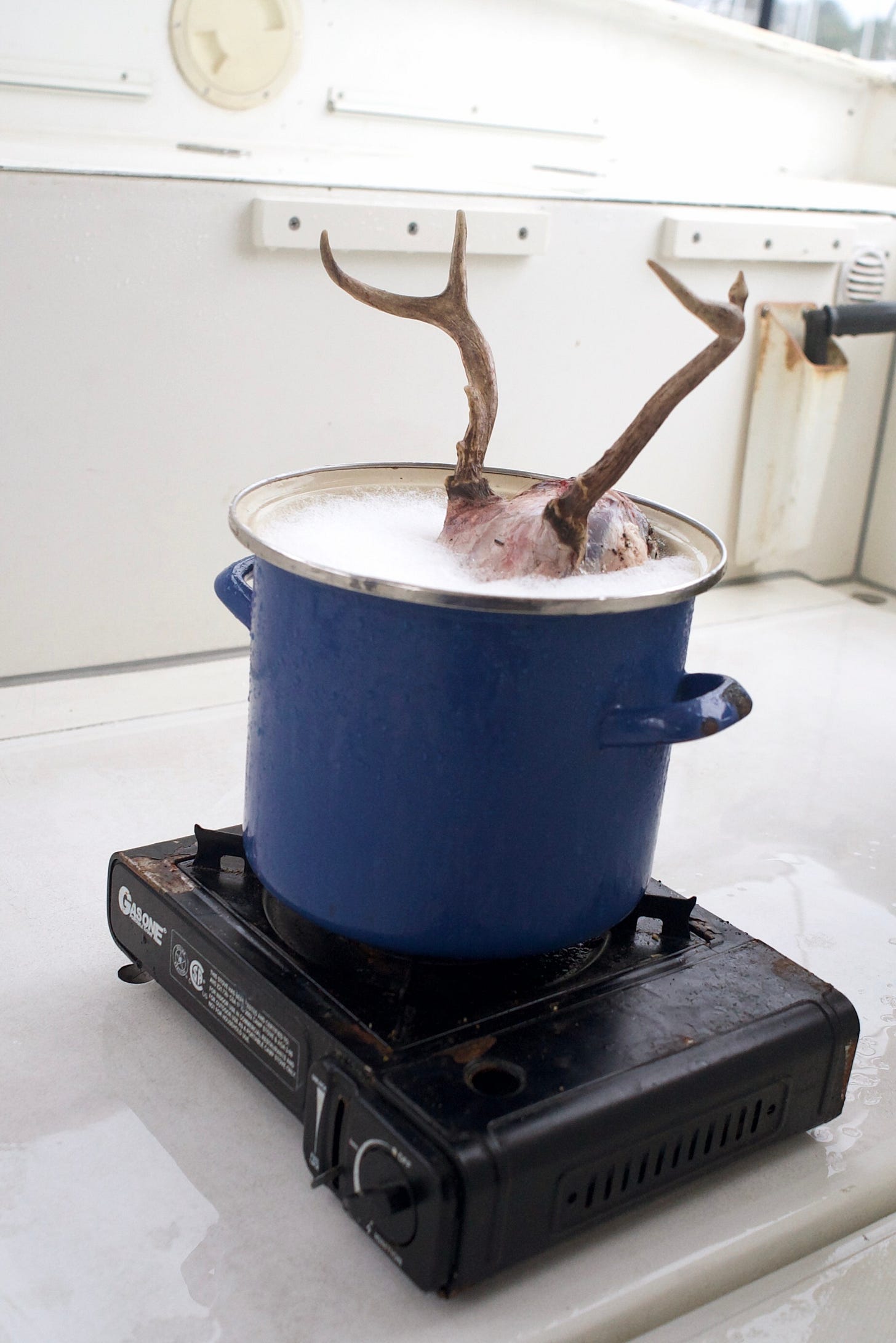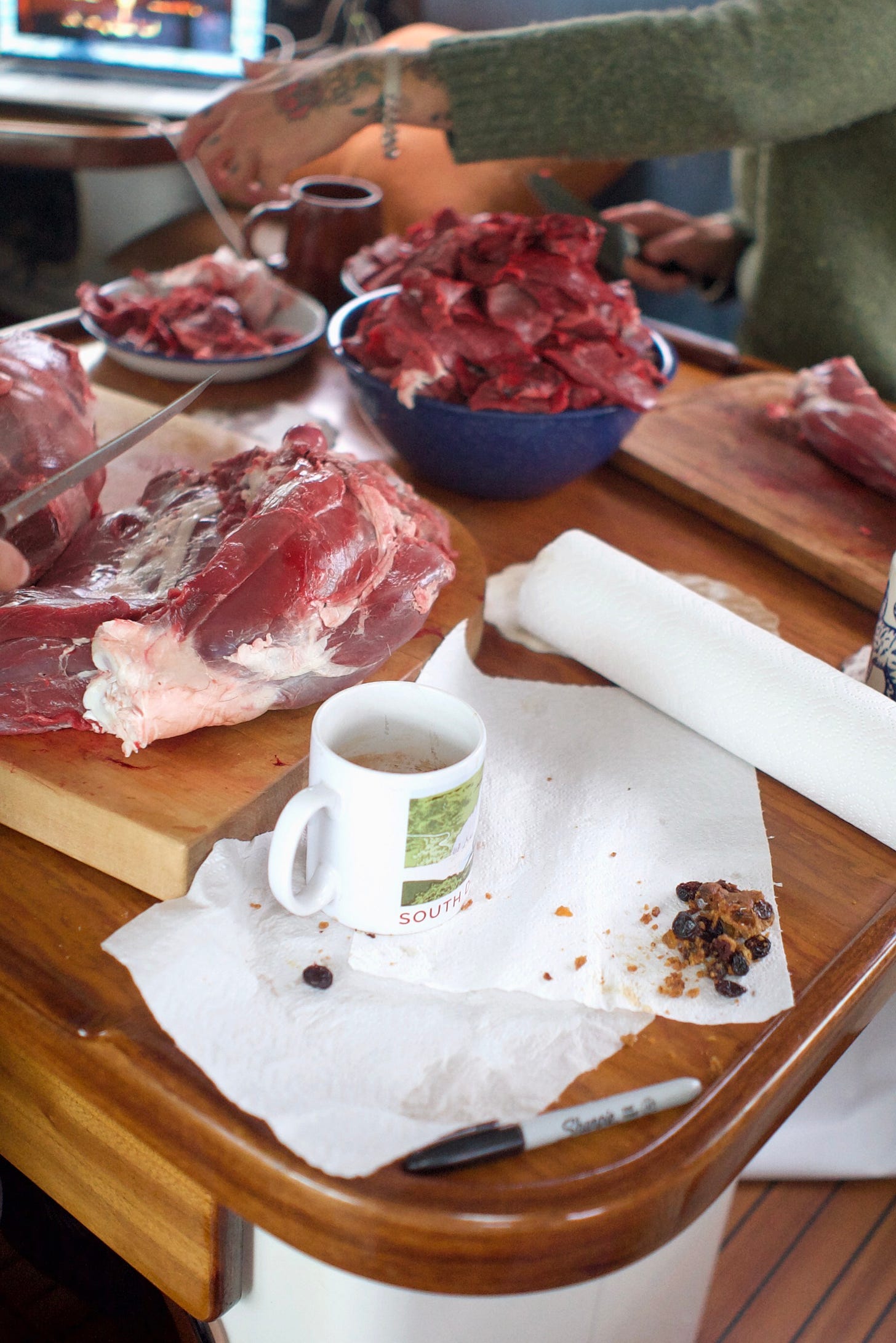Venison Cornish Pasties
Peppery tender root veg and venison encased in flaky lardy pastry
I can’t really think of a more appropriate foul weather sailing lunch or dinner than a Cornish pasty. Warm, tidy, comforting, and filling! Since the 13th century the pasty, or versions of the pasty have fed working men on the cheap. In Cornwall and the West of England these pasties would have been made by the wives of tin miners, and packed up in some linen for their husbands to take down the shaft with them. Traditionally an “Oggy” consisted of meat, potato, suede (rutabaga) and onion folded up in a flaky and substantial short crust pastry. The pasties were filling, cheap and easy to eat thanks to the chunky crimping that doubled as a handle to keep the arsenic from their hands off of their lunch.
In the 1880’s tin mining was rapidly declining in Cornwall and some miners immigrated to Michigan’s Upper Peninsula for more mining, mostly copper, opportunities. They bought their pasties with them and that’s how the “Yoopers” got the pasty!
There are some minor regional variations of the pasty: The Cornish slice their veg and the Michaganian’s cube their veg. I didn’t know about this variation until researching for this post. I cubed my veg! The Devonshire folk crimp their pasties along the top, as I did. The Cornish crimp along the side. The meat is always beef (I’m really pushing the boundaries here), and is usually skirt, chuck or rump steak cubed, although ground beef is often used today in Michigan.
Some delicious and untraditional versions I’ve had in the West Country:
Smoked Haddock and clotted cream (thanks Rick Stein!)
Cheese and onion (so simple but exceptionally delicious)
Steak and ale
Some fun facts: 120 million pasties were sold in Cornwall last year. The British phrase “Oggy, Oggy, Oggy, oi, oi, oi” originated in the 1800’s when wives and pasty sellers would announce their arrival with cries of “Oggy, Oggy, Oggy.” The miners would reply, shouting up the mine shafts “Oi, Oi, Oi.”
The venison we used is from from Trevor’s most recent Mule deer hunt. It was the first time we processed an animal on the boat, and we rallied friends together to help us chop, grind and wrap. We went heavy with the ground for this deer as it’s something we often find ourselves reaching for in the freezers.
You will need:
1 3/4 cups plain, organic flour plus extra for dusting
2/3 cup of cold, cubed butter
2/3 cup of cold rendered lard
1 cup (plus more if needed) of cold water
3/4 tsp salt
1 egg, beaten
1.5lb of ground venison (ground beef or skirt steak would be great too)
1 medium-sized rutabaga
4 medium-sized gold potatoes
1 large yellow onion
Salt and ground pepper
Method:
Make your pastry ahead of time, at least an hour, but the day before is perfect!
Add the flour to a large bowl and drop in the cold, cubed butter and lard. My lard is always too soft to cut up, even though I store it in the fridge. I just scooped mine. If yours is nice and crumbly then cube it before adding to the flour.
Using your fingers, quickly toss the fat in the flour, breaking the butter and lard up into penny sized chunks. Visible chunks of fat are what we are going for to get those layers! Sprinkle in the salt and slowly add the cold water. Use a fork to bring the dough together. The amount of water you’ll need will depend on the flour you use, the altitude you live at, the humidity etc, but 1 cup is a good starting point. Add enough water so that the dough comes together into a soft but not sticky ball. Wrap the bowl or the dough and place int he fridge to rest for at least an hour but up to a day.
When you are ready to assemble the pasties preheat the oven to 425 F.
On a floured surface roll out the chilled and rested dough. Be sure to flour both sides of the dough and your rolling pin to prevent tearing. Roll dough out to about 4mm thick. Find a bowl or cut out a template about 6” round and cut out as many founds as you can from your rolled out pastry. Stack the rounds, flouring well between layers and set them in the fridge while you re-roll the remaining pastry scraps. Gather the trim/scraps and roll out once more. Be careful not to work this last batch very much, as we want the party to remain short. Cut out the remaining 6” circles and set in the fridge with the others.
Clean the counter and get ready for assembling!
Peel and dice the rutabaga, potatoes and onion. I like to cut the rutabaga and potatoes the same size, about 1/2 inch cubes, and finely dice the onions. Set them aside in their own bowls for ease of assembling. Gather your pastry rounds, and gently roll each one out once more to make the circle about 1” bigger, about 2 rolls of the rolling pin. Add a small handful (about 6 cubes of potato and rutabaga each) to the center of each pasty and a generous sprinkle of onion. Finally add a few tablespoons of ground meat. Season very well with salt and pepper (more salt than you think, as potato greedily sucks all that salt up). You can test your filling amount by pulling up the sides of the pasty and seeing if they meet in the middle. They should only just meet, we are relying on some pastry stretch to crimp these Oggies up.
Brush one side (a semicircle) of the pasty beaten egg and pull the sides up to meet in the middle. Press the sides of the pastry starting at the center and work your way to the bottom, creating a secure seal. Gently crimp the seam using your fingers and lay them on a parchment lined baking sheet.
Repeat steps with all of the pasties and brush with beaten egg before baking for 40-55 minutes, or until pasties are golden brown. Some leaking may happen for don’t worry.
If you’d like to freeze pasties to bake later, freeze after the egg wash stage so they are oven ready!





